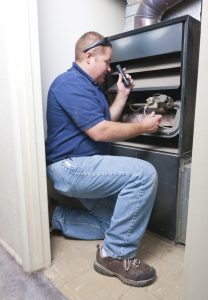 Most homes in the area use forced-air furnaces to stay warm. They are effective and cost-efficient means of heating the household: using gas-fed burners to heat the air, which can then be blown into your home with a fan.
Most homes in the area use forced-air furnaces to stay warm. They are effective and cost-efficient means of heating the household: using gas-fed burners to heat the air, which can then be blown into your home with a fan.
The heat exchanger plays a vital role in that process, and while it’s intended to last for many years, older heat exchangers can develop cracks and fractures, which are a serious problem. If yours develops such issues, you need to call a heating repair service immediately. It’s all the more important to keep a close eye on your system now, since you’re likely using your furnace more often in January than you are any other time of the year.
What Is a Heat Exchanger?
In and of itself, a heat exchanger is a fairly simple component in the heating system: simply a shaped piece of metal between the burners and the air they need to heat. Burners provide a lot of heat, but they can shift that heat to the air very effectively. The heat exchanges do that job much more effectively: the burners heat the metal, and the metal in turn can heat the air much more evenly without forcing the burners to use any more fuel than necessary.
The shaping provides an additional benefit: it channels trace toxins and gases out of the system safely through a venting pipe. That way, your home stays safe and the system continues to do its job.
Cracks Can Appear
Heat exchangers don’t suffer from a lot of wear and tear because they have no moving parts to generate friction. Furthermore, the material they are made of can stand up to decades of reliable heating, especially in parts of the country with comparatively mild winters like ours. But the constant heating and cooling of the metal every time you turn your furnace on and off can take its toll. Eventually, the metal may fail, creating fissures or cracks. That’s why it pays to keep a close eye on older systems, especially those with an expired warranty. They’re more vulnerable to this kind of damage.
And the damage can be severe indeed. Toxic gases can escape the cracks into your home, which pose an immediate safety hazard. Even were that not the case, the cracks also reduce the efficiency of the system severely, often fatally: forcing it to use massive amounts of fuel to do its job.
Most modern furnaces have safety features that will automatically switch the furnace off if a gas leak is detected. (If your furnace doesn’t for any reason, you should consider installing a gas leak detector in the vicinity.) That’s good because it alerts you to the problem, though it still leaves you with a non-functioning heating system until the issue gets addressed. Unfortunately, in most cases, it also means that you’ll need to replace the entire system, since heat exchangers are very expensive.
For heating services of all varieties in the Plano, TX area call on Hutchins Plumbing & Air Conditioning.









